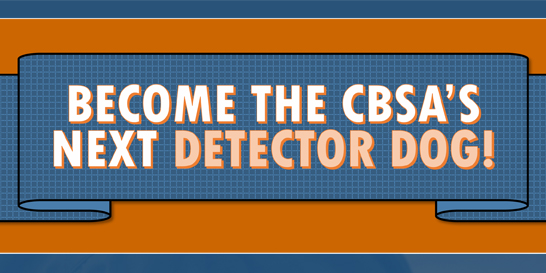Detection tools
Detector Dog Service program
The Detector Dog Service (DDS) program provides contraband detection for the Canada Border Services Agency (CBSA). DDS teams help the CBSA by detecting prohibited and regulated drugs, guns, money, and food, plant and animal products. The teams are strategically located at ports of entry across Canada, serving both traveller and commercial operations. DDS teams are equipped to quickly screen people and goods in the least intrusive manner possible. DDS teams are involved in thousands of interceptions every year and also provide public demonstrations at schools and in communities.
History
Canada Customs began using detector dogs in 1978 to help frontline officers with a more effective method of detecting drugs and firearms.
Currency detector dogs began working with border services officers (BSOs) in 2003. They helped BSOs enforce the Proceeds of Crime (Money Laundering) and Terrorist Financing Act. Today, these dog teams are part of the DDS program.
In January 2005, the DDS program expanded to include food, plant and animal detector dog teams from the Canadian Food Inspection Agency (CFIA).
Role
The DDS program plays an important role in the detection of prohibited and regulated goods entering the country by:
- increasing opportunities to intercept drugs, guns, money, and food, plant and animal products
- discouraging smugglers, while educating Canadians about the CBSA's innovative enforcement approaches
- helping border services officers simplify searches
- reducing screening times for passengers, luggage and commercial shipments
DDS teams also help other law enforcement agencies with search warrants for drugs, guns and money.
Training
Detector dog teams receive intensive training at the CBSA College in Rigaud, Québec.
The Agency also trains dogs from Correctional Service Canada (CSC) and many other domestic and international policing agencies worldwide.
Course content
Handlers learn to care for and train their dogs at the CBSA College where the animals learn to understand their new working environment.
About the dogs
The CBSA uses all types of dog breeds, such as Labrador Retrievers and Beagles, to detect contraband.
Typically, detector dogs:
- are 11 to 16 months old when training begins
- live with their handlers
- travel in air-conditioned vehicles
- work for 8 to 10 years
- retire and live with their handlers or in a home arranged by their handlers
Previously, all dogs were trained to scratch, dig, bite and bark at the source of a contraband odour. Today, the primary method of training is for dogs to give a subtle signal to their handler when detecting contraband.
Evaluation
The CBSA maintains very high standards for its dogs. Only one of 10 dogs evaluated is accepted to the program.
Once dogs go on duty, an assessor evaluates every dog team annually to ensure they are working at an effective level.
Related links
- Date modified:
